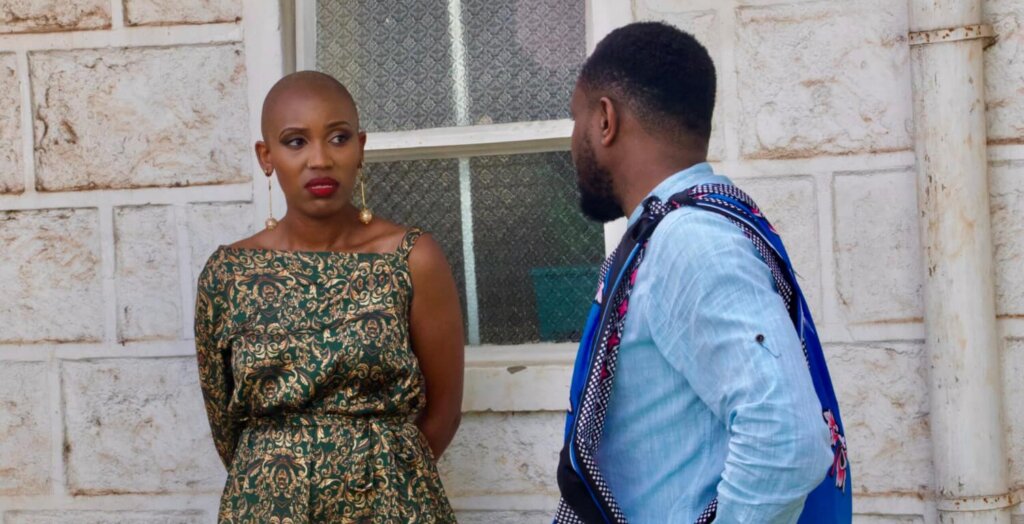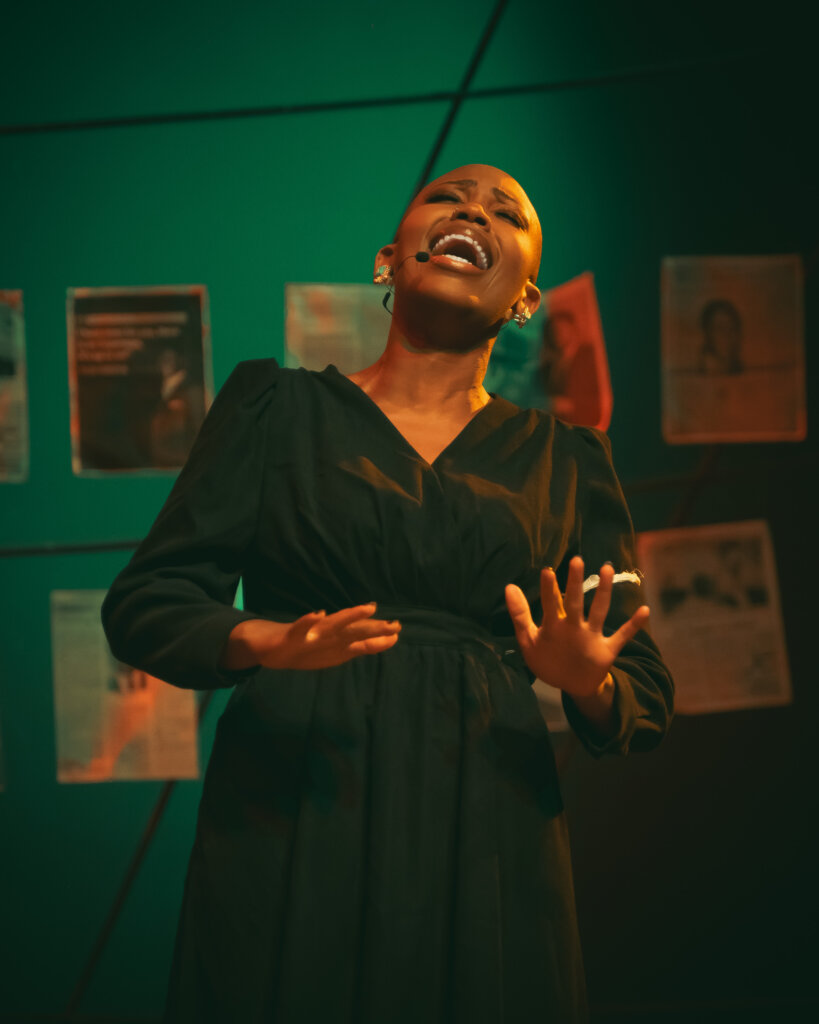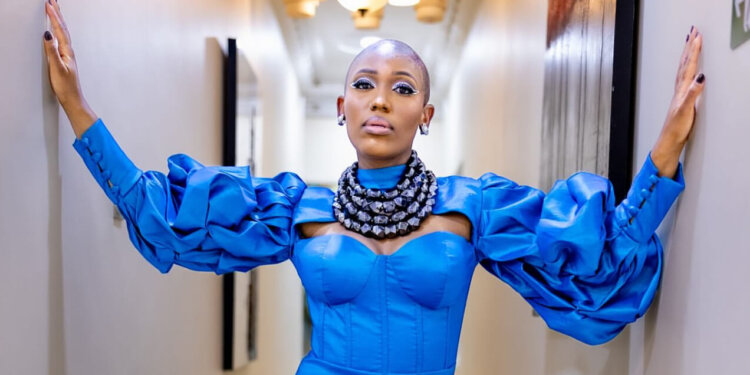In November alone, Nyokabi Macharia shifted from stage to screen, portraying multiple roles in Too Early for Birds: Tom Mboya to a cash-strapped entrepreneur in Vincent Mbaya’s comedy Sketchy Africans. This ability to effortlessly navigate between comedy and serious roles, from TV shows like Ma’Empress to County 49 to Country Queen, films like A Grand Little Lie to Chaguo, has come to define her acting career, setting her apart as one of Kenya’s most versatile actors of our time.
In 2025, she plans to mark ten years in the craft with an ambitious three-part showcase dubbed Nyokabi at 10. This celebration will include a one-woman theatre performance, a documentary, and a tour – each piece a testament to her transformative journey.
“This is so emotional. With this showcase, I’ll be looking back on 10 years of sweet memories, some really painful ones, and bitter experiences” Nyokabi says. “I’ve made mistakes along the way, and sometimes offended people even when I didn’t mean to. It’s hard to deal with that but I have to face it.” But Nyokabi at 10 is not just a reflection, it’s also a celebration. “I get to work with people I love and respect, and that means it’s going to be a joyous experience. Otherwise, what’s the point?”
Over the years, Nyokabi has garnered multiple accolades, including a Kalasha Award for Best Actress in 2022 in Chaguo, which also marked her first lead role in a film. As her career evolves, so does her outlook on life and artistry. “As I get older, I realise I’m a different version of the same person.”
Her latest project, Sketchy Africans, is a relatable and hilarious story that highlights how resourceful Kenyans can be in tough situations. She plays Miriam, a structured, detail-oriented, and independent woman who, along with a group of debt-ridden misfits, devises an elaborate scheme to get her inheritance from her rich, yet traditional family.
It all started with a phone call from Sketchy Africans director Vincent Mbaya who shared his idea of making a sketch similar to the Emmy-nominated series A Black Lady Sketch Show. “He (Mbaya) thought I had the right amount of madness for the project.”
For the role of Miriam, Nyokabi shaved her head – a bold move that not only showed her dedication but also transformed how she approached the character. “Going bald for a role is something that has always been at the back of my mind,” she says. “When I suggested it to Mbaya, he saw the vision. He said to me, ‘Miriam is a bold character and what better way to express that than going bald.’ That sealed it for me. I didn’t want to feel like Nyokabi in this role like with a few of my past projects. I wanted to be someone entirely different to bring out Miriam’s character in totality.”
This physical transformation also became a metaphor for her character’s emotional unraveling. “Something about going bald is that it exposes the cracks on your head and I noticed that I have a few bumps on my head. Others noticed too. At first, it bothered me, but I realised that was Miriam. Her cracks were coming out, someone so put together, now exposed bit by bit. It was transformative.”

Nyokabi’s methodical approach to acting continues to evolve. While researching and internalising a character’s backstory remains a cornerstone, she now embraces adding a character’s physicality to the method. “I’ve learnt to relax into my characters. Younger Nyokabi overthought everything; I didn’t know how to balance research and physicality,” she admits. “Now, I explore how a character talks, moves and inhabits their space to fully embody them.”
Interestingly, with Sketchy Africans, the universe paved the way. Nyokabi met a female Uber driver, Kabaya, who mirrored her character. “She was a real-life version of Miriam. Interacting with her gave me layered insights to add to the role.”
With roles like Miriam and previous projects like Ma’Empress and A Grand Little Lie, Nyokabi is finding her footing in comedy more and more, despite her dramatic roots. However, transitioning between the two hasn’t always been easy.
“I initially struggled with comedy because I was overthinking and trying too hard to be funny,” she admits. “The director had to remind me that the humour is in the situation, not in trying to ‘act funny.’ Once I relaxed, everything clicked.”
Whether in comedy or drama, nuance is something Nyokabi has pursued throughout her career. The trend of writing lead characters as either perpetually distressed or impossibly perfect has often left her craving more complexity. But who is responsible for creating layered characters with depth and flaws? Is it the writer, the director or the actor?
For Nyokabi, the answer is collaboration. “I’m not afraid to interrogate and ask why? Everyone in production needs to interrogate more and pull their weight to add that extra layer. They say the director sees the forest, and the actor sees the tree. It’s my job to take care of my tree because I know it better than anyone else,” she says.
Beyond the screen, Nyokabi has made her mark on stage, most recently in Too Early for Birds’ Tom Mboya, an immersive three-hour play that “transcends the physical and auditory manifestations” as described by Sinema Focus’ Tonny Ogwa. In Tom Mboya, she had to play multiple characters, a challenge she embraced wholeheartedly.

“Playing multiple characters meant paying attention to even the smallest details like their costume and walking style. This made all the difference,” she says. “It was incredible to be part of a production so relevant to the times. The energy in the audience was so different. When we staged the show earlier in the year during the protests, it felt like we were contributing to history.”
While Nyokabi’s career is a testament to her talent, she acknowledges the systemic challenges Kenyan actors face. In her 2022 Kalasha Award acceptance speech, she called for better pay, working conditions, and royalties for actors. With the Kenya Actors Guild under new leadership, she remains optimistic about the future.
“I was surprised when I received my first royalties check for A Grand Little Lie,” she says. “I got my medical insurance working under Multan Production on Selina. All this made me realise we’re not crazy for demanding such things. My greatest desire is that a time will come when the term msanii carries the dignity it deserves.”
Enjoyed this article?
To receive the latest updates from Sinema Focus directly to your inbox, subscribe now.












You never think about how much work goes into bringing forth these characters we’ve come to love until you hear about it from the actors. The term ‘msanii’ does deserve to hold honor
I totally agree and could not say such profound sentiments any better. Please let’s continue supporting our own and give them their deserving flowers ..cheers